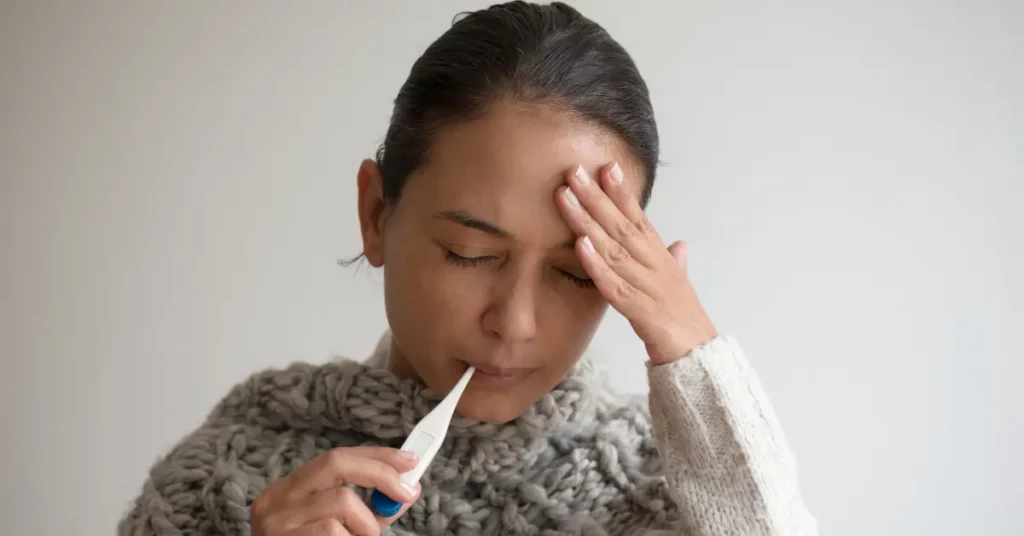Understanding HIV Night Sweats: Symptoms, Causes, and Treatment
Human Immunodeficiency Virus (HIV) is a global health concern that affects 39.0 million people worldwide, according to WHO.
The virus weakens the immune system, which makes individuals more susceptible to infections and illnesses.
Early symptoms of HIV can vary, but one notable sign is night sweats, which may manifest 2-4 weeks after exposure to the virus.
In this article, we will delve into HIV night sweats as its symptom, explore the causes, and discuss treatment options.
Night sweats and HIV

Night sweats, also known as sleep hyperhidrosis, are characterized by excessive perspiration during sleep drenching bedclothes, sheets, and blankets.
In individuals with HIV, it can be a result of the body’s response to the virus.
When the immune system detects HIV, it may elevate body temperature as a defense mechanism.
However, it’s important to note that night sweats alone are not a definitive sign of HIV.
They can result from various factors, and while they are prevalent in individuals with HIV, they often coincide with other symptoms:
- Fever
- Weight loss
- Diarrhea
- Enlarged lymph nodes
- Joint pain
When do night sweats happen
Night sweats in HIV typically occur during the first 2-4 weeks after infection, which is known as the acute stage.
This phase is characterized by the rapid multiplication and spread of the virus in the body, often accompanied by flu-like symptoms, including night sweats.
It’s important to note that while some individuals experience symptoms during this acute phase, others may not have any noticeable signs until the later stages of the infection.
Causes of night sweats in HIV
Night sweats in HIV can be a manifestation of the acute illness during Seroconversion, a period when antibodies become detectable in the blood.
They can also arise due to associated infections like Mycobacterium avium complex (MAC) or Histoplasmosis.
While HIV can lead to night sweats, it’s important to note that they are typically part of a cluster of symptoms during the acute illness that accompanies seroconversion.
Treatment of night sweats

The primary focus of managing night sweats in individuals living with HIV involves addressing the underlying condition through Antiretroviral therapy (ART).
ART is a comprehensive treatment approach that aims to control the replication of HIV within the body, subsequently reducing the viral load.
By doing so, ART helps the immune system function more effectively and decreases the risk of transmitting the virus.
While ART is crucial for managing HIV, individuals experiencing night sweats may require immediate relief.
Here are some strategies that can be employed to alleviate night sweats:
- Change bedding: To manage persistent night sweats, changing bedding frequently is crucial. Additionally, using a waterproof pad helps protect the mattress from becoming saturated, ensuring a more hygienic sleeping environment
- Temperature adjustment: Regulating the room temperature is key. Opening a window or using a fan for air circulation can alleviate the discomfort. However, caution is advised against creating an overly chilled environment to prevent catching a chill
- Seek medical attention: If night sweats become severe or increase in frequency, it’s essential to consult a healthcare provider promptly. The symptoms could indicate an underlying health condition, needing attention and proper treatment
Conclusion
Night sweats can indeed be an early symptom of HIV, particularly during the acute phase of the infection.
However, it’s crucial to understand that night sweats alone are not a definitive indicator of HIV.
They often accompany a cluster of symptoms, including fever, weight loss, and enlarged lymph nodes.
Managing night sweats in individuals with HIV involves addressing the underlying condition through Antiretroviral therapy (ART).
While ART is crucial, immediate relief from night sweats can be attained through simple measures like cool baths, changing bedding, and temperature adjustment.
Overall, understanding the relationship between night sweats and HIV is vital for managing these symptoms and supporting overall health in individuals living with the virus.
Frequently Asked Questions
What STD can cause night sweats?
Night sweats can be associated with various Sexually Transmitted Infections (STIs) or STDs. Still, they are not typically a primary or common symptom of most STDs. However, certain infections like HIV, particularly during the acute phase, may lead to night sweats as a symptom.
At what stage does HIV cause night sweats?
Night sweats in HIV often occur during the acute stage, which is typically within the first 2-4 weeks after initial exposure or infection. This stage, known as seroconversion, involves rapid viral replication in the body and may present flu-like symptoms, including night sweats.
Does night sweats mean infection?
Night sweats alone do not necessarily indicate an infection. While night sweats can be a symptom of various infections, they are not specific to any particular illness. Night sweats can result from numerous factors, including infections, hormonal changes, medications, or even non-infectious conditions.
Can you have night sweats without HIV?
Yes, night sweats can occur due to various reasons other than HIV. They can be caused by infections (like tuberculosis or certain bacterial infections), hormonal imbalances (such as menopause), certain medications, anxiety, or even some cancers. Therefore, experiencing night sweats doesn’t automatically imply HIV infection.
WowRx uses only high-quality sources while writing our articles. Please read our content information policy to know more about how we keep our content reliable and trustworthy.






